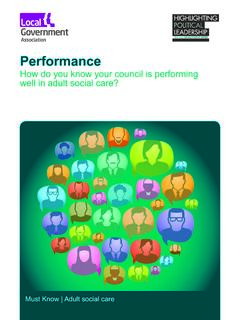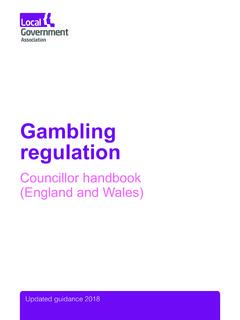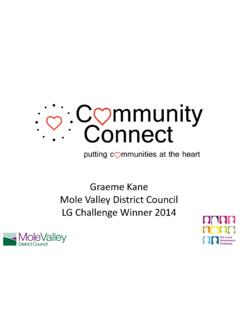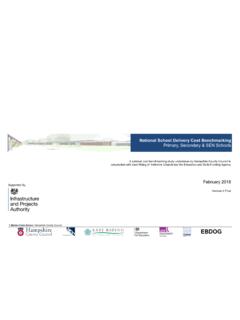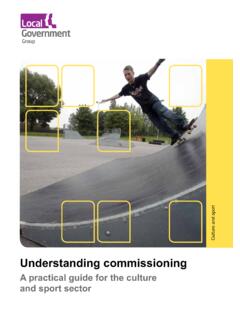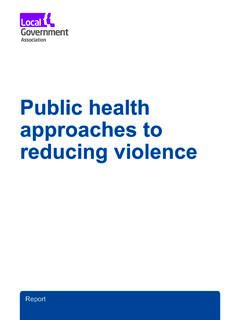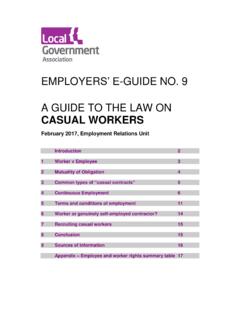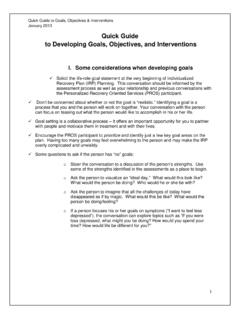Transcription of A councillor's workbook on planning
1 A councillor s workbook on planningCouncillor workbookContentsForeword 3 Introduction 4 planning what is it good for? 4A brief introduction to planning 5 Decision-takers in planning 6 The main elements in planning 8 What is your role in plan making? 11 The planning decision 14 What do I need to know about how a planning committee operates 15 Infrastructure contributions and community benefits 18 planning enforcement 18A councillors workbook on planning3 This workbook has been designed as a development aid for elected members regardless of their experience or responsibilities.
2 Its content is aimed at supporting both existing and newly elected members in their role as council and community representatives. It makes no judgment about whether you have been a member for some time or you are newly elected in to the workbook will brief and update you on the key aspects of the changing role and responsibilities of ward members, in the context of the opportunities and challenges facing our members who are new to local government will benefit from how the workbook quickly will bring you up to speed on the main areas of the ward member role. It will help you identify how you can focus on the key skills needed to be effective in carrying out your day to day workbook offers few firm rules for ward members as it recognised that each individual must decide how best to approach the role.
3 This will be influenced by the ward you represent and the methods and approaches that suit you best. The workbook should serve as a direction marker rather than a road practical terms the workbook will take you two to three hours to work through. You can dip and out of the workbook working at a pace that suits you benefit fully you need to think about your own approach in influencing other people how the material relates to work in your locality, the people you serve and the council you you work through the book you will find a number of features designed to help you think about community leadership and the councillor s role: ForewordGuidance this is used to indicate research, quotations, explanations and definitions that you may find these are questions or queries raised in the text which ask you to reflect on your role or approach in essence, they are designed to be studies these are pen pictures of approaches used by other people or and tips these represent a selection of good practices which you may find links these are signposts to sources of further information and support, outside the workbook , which may help with principles, processes, methods and approaches 4 A councillors workbook on planningIntroductionPlanning what is it good for?
4 If you think about planning , what word(s) come into your mind?To some councillors planning is exciting and visionary, it is about improving the environment, making places and communities work, a way of securing tangible improvements and investments, of shaping the future, and a mechanism for getting involved in decisions on things that matter to people. To others, it is bureaucratic, confrontational, stifles creativity, and pits neighbours against each other. Some residents fear it, don t trust it, and think it fails them. Some businesses see it as stifling innovation and enterprise. Whatever your view of the value of planning it is a council activity that as a councillor you should take seriously. The Local Plan, planning proposals and decisions are all things that the public are interested in, although not all of the time.
5 If you think about how many more members of the public turn up for a planning committee than a full council meeting, you can tell what sparks interest and strong views. This workbook will help you to understand how the planning system in England works. Naturalenvironmental,renewableresourceLo calenvironmentalSocialequalitySocial inclusioncommunitiesA councillors workbook on planning5A brief introduction to planningAt a high level planning is about making places, developing communities, and shaping the future. It plays a critical role in identifying what development is needed and where, what areas need to be protected or enhanced, and in assessing whether proposed development is suitable. planning is about upholding the wider public interest for the benefit of the whole community and not just individual constituents or particular goal is to plan for and deliver sustainable development, which means balancing the economic, environmental and social impacts of new development.
6 Finding this balance and giving the appropriate weight to the different priorities is part of your job as a decision maker. At a more everyday level planning is about what people and businesses want to do or see happen with buildings and land: house extensions and alterations, changes in the shopping area, pubs converting to housing, businesses expanding and contracting, energy proposals, and new housing. There are three main aspects to the planning system: plan-making (preparing local plans) development management (dealing with planning applications, proactively managing development) enforcement and monitoring (monitoring how policies and developments are being implemented, including enforcement against breaches of planning ).
7 6 A councillors workbook on planningDecision-takers in planningLocal planning authoritiesLocal government administers much of the planning system. District councils are responsible for most planning matters, other than transport and minerals and waste planning which are typically functions of the county council. In single tier areas authorities have responsibility for both district level and county level planning matters. In London the Mayor also has powers to determine certain planning applications of potential strategic importance. In a national park, planning functions are carried out by the park authority. The Government wants to see planning decisions taken at the lowest level possible and has introduced the ability for parish and town councils to produce neighbourhood plans which, once in force, form part of the policies used to make decisions on applications.
8 Where there isn t a parish or town council, representatives of the local community can apply to establish a neighbourhood forum to prepare a Neighbourhood Plan. Local planning authoritiesDistrict councilsCounty councilsboroughsA councillors workbook on planning7 CouncillorsCouncillors have a key role in planning by: making sure that local people are involved in planning , by acting as a liaison between communities and the council and raising local issues, and helping residents to understand what the council is doing by helping to set the direction of planning policy by being a decision maker on the planning committee; committees generally deal with around 5-10 per cent of the applications determined, usually the most strategic and complex proposals helping to set the vision and culture within the planning service, and working with authority officers support councillors and deliver the service to applicants and residents.
9 The efficiency and effectiveness of officers is really important in how people perceive the planning service (along with councillors and the committee). Most decisions on planning applications are delegated to officers to deal with, in accordance with the terms set out in the authority s constitution. At planning committees, officers advise, councillors decide. planning decisions can also be made by the Secretary of State for Communities and Local Government (on a small number of decisions through the appeals system, the call-in process and decisions on nationally significant infrastructure projects); and the planning Inspectorate (PIN), a government agency responsible for deciding most appeals on behalf of the Secretary of State.
10 8 A councillors workbook on planningThe main elements of planningPlan making the local planCouncils have to have a plan for their area, which sets out how the council want the place to develop over the next 15-20 years, taking into account evidence gathered, and engaging with their communities to garner their views and input. Having a plan enables a council to think seriously about the direction of a place, gives clarity to residents and investors, acts as a delivery plan for the council and is the framework against which planning applications are assessed. Local plans address needs and opportunities in relation to housing, the local economy, community facilities and infrastructure. They should also safeguard the environment, enable adaptation to climate change and help secure high quality accessible design.
